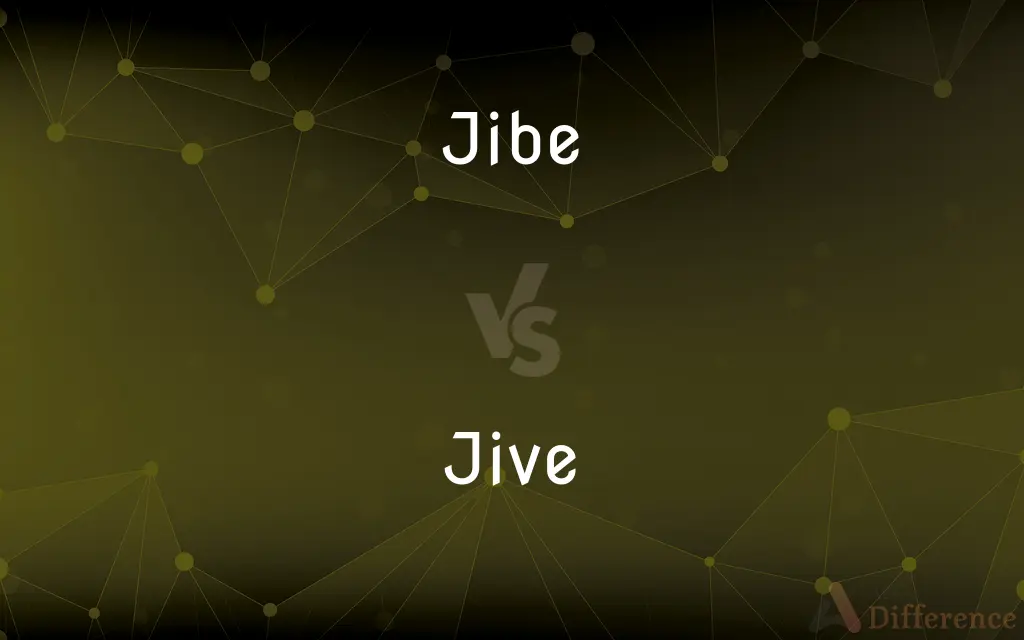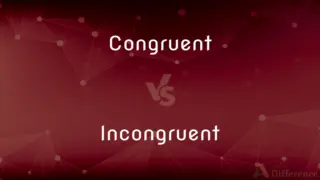Jibe vs. Jive — What's the Difference?
Edited by Tayyaba Rehman — By Fiza Rafique — Updated on April 3, 2024
Jibe is about agreement or being in accord, often used in sailing to mean a change in direction. Jive is a lively form of dance or to speak deceptively.

Difference Between Jibe and Jive
Table of Contents
ADVERTISEMENT
Key Differences
Jibe, in its primary usage, refers to the action of changing direction by shifting the sails from one side to the other while sailing, a maneuver also known as gybing. On the other hand, jive is a style of dance that originated among African American communities in the early 20th century, characterized by lively and bouncing movements.
Jibe can also mean to be in agreement or harmony with something. It suggests a consistency or accord in opinions or facts. Whereas, jive, in a different context, refers to insincere, deceptive, or nonsensical talk. It implies a form of communication that is not meant to be taken seriously.
The term jibe is used in a metaphorical sense to indicate when ideas or statements align or are coherent with each other. Jive, conversely, has evolved in colloquial language to describe actions or words that are misleading or meant to deceive.
Jibe's usage is often found in more formal or technical contexts, such as nautical terminology or in discussions where agreement and consistency are being assessed. Jive, however, thrives in informal settings, often associated with music, dance, and casual conversation.
Jibe's alignment or disagreement can be subtle, requiring careful consideration to understand if things truly align. Jive's misleading nature is generally more apparent, as it often involves an element of obvious exaggeration or flamboyance.
ADVERTISEMENT
Comparison Chart
Definition
A sailing maneuver or agreement/concordance
A lively dance or insincere talk
Origin
Nautical term
African American dance and music culture
Context
Sailing, agreement
Dance, deceptive communication
Connotation
Technical, alignment
Informal, misleading
Usage in Speech
"Their stories don't jibe."
"Stop jiving me with your excuses."
Compare with Definitions
Jibe
To shift the sails from one side to the other while sailing.
The captain decided to jibe the sailboat to catch the wind properly.
Jive
A lively form of dance, often performed to swing music.
They won the contest with their energetic jive routine.
Jibe
To be in accord; to agree.
Their accounts of the event jibe with the video evidence.
Jive
Slang for deceptive or nonsensical talk.
He's full of jive, never taking things seriously.
Jibe
Alignment of opinions or facts.
The theory jibes with our observations.
Jive
To tease or joke in a playful manner.
They were just jiving you, no harm meant.
Jibe
Agreement or harmony in ideas.
Their philosophies jibe, making them great partners.
Jive
Communication meant to mislead.
Her excuse sounded like a lot of jive at first.
Jibe
A maneuver in sailing to change direction.
A smooth jibe can be challenging in strong winds.
Jive
Music characterized by a strong rhythmic beat, associated with early jazz.
The band's jive tunes got everyone on the dance floor.
Jibe
A jibe (US) or gybe (Britain) is a sailing maneuver whereby a sailing vessel reaching downwind turns its stern through the wind, which then exerts its force from the opposite side of the vessel. For square-rigged ships, this maneuver is called wearing ship.
Jive
Jazz or swing music.
Jibe
To shift a fore-and-aft sail from one side of a vessel to the other while sailing before the wind so as to sail on the opposite tack.
Jive
The jargon of jazz musicians and enthusiasts.
Jibe
To cause (a sail) to jibe.
Jive
To play or dance to jive music.
Jibe
To be in accord; agree
Your figures jibe with mine. See Usage Note at jive.
Jive
To talk in an exaggerated, teasing, or misleading way.
Jibe
Variant of gibe.
Jive
To talk or chat
"You just jive in one big group, putting each other on, trying to top the last line" (Time).
Jibe
The act of jibing.
Jive
(Usage Problem) To be in accord.
Jibe
A facetious or insulting remark; a jeer, a taunt.
He flung subtle jibes at her until she couldn’t bear to work with him any longer.
Jive
To speak to (someone) in an exaggerated, teasing, or misleading way.
Jibe
Alternative spelling of gybe
Jive
Misleading, phony, or worthless
Talking jive nonsense.
Jibe
(transitive) To reproach with contemptuous words; to deride, to mock, to taunt.
Jive
To deceive; to be deceptive.
Don’t try to jive me! I know where you were last night!
Jibe
(transitive) To say in a mocking or taunting manner.
Jive
To dance, originally to jive or swing music; later, to jazz, rock and roll, rhythm and blues, disco, etc.
Jibe
(intransitive) To make a mocking remark or remarks; to jeer.
Jive
(uncountable) A dance style popular in the 1940–50s.
Jibe
To accord or agree.
That explanation doesn’t jibe with the facts.
Jive
(uncountable) Swing, a style of jazz music.
Jibe
Alternative spelling of gybe
Jive
(uncountable) A slang associated with jazz musicians; hepcat patois or hipster jargon.
Jibe
To shift, as the boom of a fore-and-aft sail, from one side of a vessel to the other when the wind is aft or on the quarter. See Gybe.
Jive
Synonym of bullshit: patent nonsense, transparently deceptive talk.
Don’t give me that jive. I know where you were last night.
Jibe
To agree; to harmonize.
Jive
African-American Vernacular English.
Jibe
An aggressive remark directed at a person like a missile and intended to have a telling effect;
His parting shot was `drop dead'
She threw shafts of sarcasm
She takes a dig at me every chance she gets
Jive
A style of jazz played by big bands popular in the 1930s; flowing rhythms but less complex than later styles of jazz.
Jibe
Be compatible, similar or consistent; coincide in their characteristics;
The two stories don't agree in many details
The handwriting checks with the signature on the check
The suspect's fingerprints don't match those on the gun
Jive
A style of jazz played by big bands popular in the 1930s; flowing rhythms but less complex than later styles of jazz
Jibe
Shift from one side of the ship to the other;
The sail jibbed wildly
Jive
Dance to jive music; dance the jive
Common Curiosities
What does it mean when ideas "jibe"?
It means the ideas are in agreement or harmony.
Are "jibe" and "gybe" the same?
Yes, "gybe" is an alternative spelling of "jibe," especially in the context of sailing.
Does "jibe" imply a judgment of truth?
Indirectly, as it refers to consistency and agreement among facts or statements.
Is "jibe" only related to sailing?
No, it's also used to describe agreement between ideas or facts.
How is "jive" used in a sentence referring to communication?
"Don't give me that jive" means "Don't talk nonsense to me."
Is "jive talk" considered disrespectful?
It can be, depending on context, as it implies insincerity or deception.
Is it offensive to accuse someone of "jiving"?
It can be, as it suggests they are being deceitful or not serious.
Can "jibe" be used in scientific contexts?
Yes, to describe when theories or data are in agreement.
What's the best way to tell if someone is "jiving"?
Look for inconsistencies or exaggerated statements that seem insincere.
Is it correct to say a dance "jibes"?
No, that would be a misuse. "Jive" is the correct term for the dance.
Do "jibe" and "jive" originate from the same root?
No, they have different etymological roots and cultural histories.
Can someone "jibe" with a group?
Yes, it means their ideas or personality are in harmony with the group.
Can "jive" ever be used positively?
Yes, especially in the context of dance or lively music, it has a positive connotation.
Can "jive" music be played at formal events?
While traditionally associated with informal settings, it can be adapted for more formal events.
Is knowing how to "jive" dance important?
It depends on your interest in dance styles, especially those rooted in swing music.
Share Your Discovery

Previous Comparison
Congruent vs. Incongruent
Next Comparison
Request vs. QuestAuthor Spotlight
Written by
Fiza RafiqueFiza Rafique is a skilled content writer at AskDifference.com, where she meticulously refines and enhances written pieces. Drawing from her vast editorial expertise, Fiza ensures clarity, accuracy, and precision in every article. Passionate about language, she continually seeks to elevate the quality of content for readers worldwide.
Edited by
Tayyaba RehmanTayyaba Rehman is a distinguished writer, currently serving as a primary contributor to askdifference.com. As a researcher in semantics and etymology, Tayyaba's passion for the complexity of languages and their distinctions has found a perfect home on the platform. Tayyaba delves into the intricacies of language, distinguishing between commonly confused words and phrases, thereby providing clarity for readers worldwide.
















































